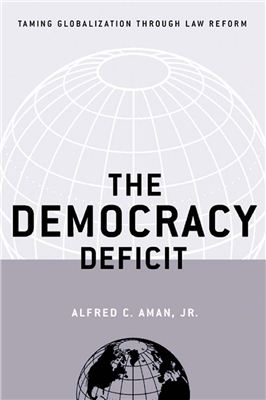NYU Press (December 1, 2004). 267 pages. Economic globalization has
had a chilling effect on democracy since markets now do some of the
work that govements used to do through the political process.
More than two decades of deregulation have made a healthy economy
appear to depend on unrestrained markets. But appearances are
misleading—globalization is also a legal and political process. The
future of democracy in the twenty-first century depends on the
ability of citizens to reclaim a voice in taming globalization
through domestic politics and law reform.
"The book's topic could not be more important: how do we adapt contemporary democratic goveance- and contemporary administrative law- to the challenge of a globalizing world?"—Kal Raustiala, UCLA School of Law
Can citizens gove globalization? Aman argues that they can, and that domestic law has a crucial role to play in this process. He proposes to redefine the legal distinction between public and private to correspond to the realities of the new role of the private sector in delivering public services, and thereby to bring crucial sectors of globalization back within the scope of democratic reform.
Basing his argument on the history of the policies that led to globalization, and the current policies that sustain it, Aman advocates specific reforms meant to increase private citizens' influence on globalization. He looks at particular problem areas usually thought to be domestic in nature, such as privatization, prisons, prescription drugs, and the minimum wage, as well as constitutional structural issues such as federalism and separation of powers.
"The book's topic could not be more important: how do we adapt contemporary democratic goveance- and contemporary administrative law- to the challenge of a globalizing world?"—Kal Raustiala, UCLA School of Law
Can citizens gove globalization? Aman argues that they can, and that domestic law has a crucial role to play in this process. He proposes to redefine the legal distinction between public and private to correspond to the realities of the new role of the private sector in delivering public services, and thereby to bring crucial sectors of globalization back within the scope of democratic reform.
Basing his argument on the history of the policies that led to globalization, and the current policies that sustain it, Aman advocates specific reforms meant to increase private citizens' influence on globalization. He looks at particular problem areas usually thought to be domestic in nature, such as privatization, prisons, prescription drugs, and the minimum wage, as well as constitutional structural issues such as federalism and separation of powers.

